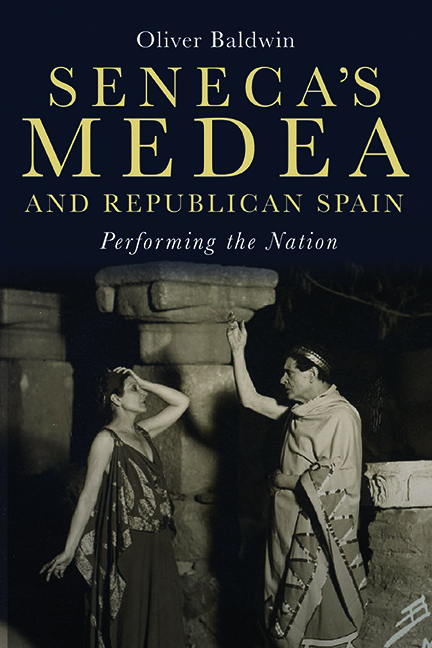Book contents
- Frontmatter
- Dedication
- Contents
- List of illustrations
- Acknowledgements
- List of abbreviations
- Introduction: A Spanish Medea in Republican Spain
- I Seneca’s Medea in Mérida: A reconstruction
- II Seneca and Hispania
- III Republica nunc sum: Building a Republic
- IV Medea and the social revolution
- V Hispano-Roman tragedy on a reformed stage
- Conclusion: The Republican Medea that was in Mérida
- Bibliography
- Index
I - Seneca’s Medea in Mérida: A reconstruction
Published online by Cambridge University Press: 07 October 2022
- Frontmatter
- Dedication
- Contents
- List of illustrations
- Acknowledgements
- List of abbreviations
- Introduction: A Spanish Medea in Republican Spain
- I Seneca’s Medea in Mérida: A reconstruction
- II Seneca and Hispania
- III Republica nunc sum: Building a Republic
- IV Medea and the social revolution
- V Hispano-Roman tragedy on a reformed stage
- Conclusion: The Republican Medea that was in Mérida
- Bibliography
- Index
Summary
On 18 June 1933, the ruins of the Roman Theatre in Mérida, in Western Spain, awaited their first professional performance in sixteen centuries: Seneca's Medea, translated by the philosopher and playwright Miguel de Unamuno, performed by the Xirgu-Borràs theatre company and directed by Cipriano Rivas Cherif. The performance gathered local people from the region of Extremadura, national authorities, international dignitaries and intellectuals. It became a success of profound repercussions and impact:
It has been a long time since there was last in Spain a theatrical event of the magnitude of that celebrated on Sunday in the Roman Theatre in Mérida. It found in the audience the resonance, support and devotion which in any cultured country events such as this encounter and awaken.
The day of Seneca's Medea
Over three thousand people attended the performance of Seneca's Medea. The Roman Theatre originally had enough capacity to sit five thousand spectators, but, in order to guarantee comfort and avoid having an unmanageable crowd, it was decided to reduce the seats to three thousand by not selling tickets for the summa cavea. Even so, Rivas Cherif and the Mayor of Mérida had decided to add extra seats in the first three rows and so extend the theatre's capacity, given that tickets had been sold-out for days. In the theatre, locals, eager to hear Medea, according to the Prime Minister, Manuel Azaña, were joined by audience members from Madrid, Barcelona and other provinces, including some from neighbouring Portugal and others from even further afield, like Toulouse. A group of ateneístas, members of one of the most distinguished intellectual institutions in the country, the Ateneo de Madrid, also attended under a ‘reptile fund’ given to them by the Ministerio de Gobernación (Interior Ministry), according to José Prat, an ateneísta himself. They sat alongside ateneístas from the Ateneo de Sevilla and the Ateneo de Huelva. Amongst the three thousand spectators, Juan Herrera, the critic for Diario de Córdoba, found it necessary to highlight the presence of ‘many ladies’ in the crowd (see p. 199).
- Type
- Chapter
- Information
- Seneca's Medea and Republican SpainPerforming the Nation, pp. 31 - 70Publisher: Boydell & BrewerPrint publication year: 2022



